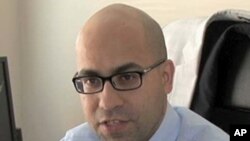Syrians outside of Syria are finding ways to help support the pro-democracy movement in their country.
Until recently, Chicago attorney and human rights activist Yaser Tabbara was welcomed in Syria for helping to develop the education system in the land of his birth. Now he is considered an enemy of the state.
“My name has been circulated on Syrian media as a pro-American traitor," he said.
That notoriety stems from Tabbara's efforts to encourage international pressure on President Bashar al-Assad's government. Tabbara has pushed for a U.N. Security Council resolution condemning the crackdown in Syria. And he has prepared a case for the International Criminal Court to charge the Assad regime with crimes against humanity. “And what we argue is that the more unified the international community [gets] behind the idea of deligitimizing Assad and his regime and isolating him economically, diplomatically, politically, the more reinforced the pro-democracy movement on the ground becomes," he said.
Illinois State University Political Science Professor Yusuf Sarfarti says that kind of international pressure has limited effectiveness without continued strife inside Syria. “The most important thing is the internal pressure. So without the internal pressure, without people taking on the streets, without people in Syria demanding change, there won’t be any change," he said.
But Sarfati says outside help will encourage the pro-democracy movement in Syria to continue. “The change has to come from the Syrian people like it happened in Egypt with the people power. But, of course, they can always use international allies. They can use them for getting certain aid. They can use them for technology. They can use them for organizing their own protests to get at least the psychological support from the outside world as well," he said.
That is precisely the role of Chicago physican Ammar Bayrakdar. He supports Syrian demonstrators on Facebook, and has researched ways to get information out of Syria. “I cannot really give you detail, but one of them I can tell you is a camera that can be put as a Bluetooth and can record without the government actually coming after them. That’s helping get the word out to the international community," he said.
Dr. Bayrakdar is a member of Chicago’s large Syrian American community. He says speaking out against the government in Syria or organizing demonstrations is not common for his people. “We’re Assyrian. We were never active in politics. That’s the way we were raised, unfortunately. When we came to this country, we figured out how democracy and how freedom of speech and freedom to assemble. So even when we come here, there is a major fear that if we do anything, that something might happen to our family or even us when we go back home," he said.
But outrage at the crackdown in Syria is replacing that fear. More than 500 demonstrators gathered recently in Chicago to criticize the Assad regime. And as the strife in Syria continues, the more angry and mobilized Syrians outside the country become.





